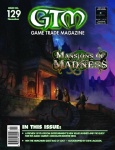 Rolling for Initiative is a weekly column by Scott Thorne, PhD, owner of Castle Perilous Games & Books in Carbondale, Illinois. This week Thorne recounts lessons reviewed from the Game Industry Gathering.
Rolling for Initiative is a weekly column by Scott Thorne, PhD, owner of Castle Perilous Games & Books in Carbondale, Illinois. This week Thorne recounts lessons reviewed from the Game Industry Gathering.Spent three days last week at the annual GIG (Game Industry Gathering) hosted this year by Titan's Entertainment Café in Battle Creek, Michigan. A large part of the event revolved around trying out new games, shown off by representatives from Mayfair Games, ElfinWorks and Steve Jackson Games and a tour of local comic and game shops in the Kalamazoo/Battle Creek area. Attendees spent the time not doing any of the above discussing the game industry and business in general. That got me to thinking about the concepts of marketing and promotion and how many people, including those who should know better, use the two terms interchangeably. All promotion is marketing but not all marketing is promotion.
A basic description of marketing runs "any function that serves to move the product from conception to the consumer’s hands." The American Marketing Association’s definition says the same thing, only with more words. Common shorthand refers to the four Ps of marketing: product, price, place and promotion.
Product refers to anything made by a manufacturer or publisher designed for use by someone else (services are included in the definition of a product but have different characteristics that differentiate them from physical products). B2C (business to consumer) products target the ultimate consumer while B2B (business to business) products are used by in the process of producing or marketing B2C products. ElfinWorks' Jerusalem game is a B2C product, while the machinery used to manufacture the box is a B2B product.
Price refers to how much someone charges to perform a service or provide a product. Usually, the price covers cost of the materials in the product, overhead associated with the product, and a profit. Not always, though. Amazon.com forwent a profit on products for years in order to build the size of the company and gain market share. Most companies, however, don't have enough capital behind them to sell at a loss for long periods of time.
Place considers where you plan to sell the product. Publishers have two general choices: direct or indirect channels. Using the direct channel, the publisher sells its product directly to the consumer. This method generates more gross profit for the publisher, but does increase operating expenses, as it has to pay to fulfill direct orders from customers. The indirect channel utilizes distributors and retailers, shifting fulfillment duties from the manufacturer to the other channel members and reducing the manufacturer's gross profit to pay the distributor and retailer for the services they provide.
Finally, promotion communicates information about the product to the appropriate parties through advertising, sales promotion, personal selling or publicity. If the manufacturer is using the direct channel, promotion only needs to target the consumer. If using the indirect channel, manufacturer promotional messages need to target not only the consumer but also the distributor and retailer. Similarly, distributor promotions target the retailer and retail promotions target the consumer. Almost never do distributor promotions target the consumer, nor do promotions from retailers or distributors target upchannel members. Alliance's Game Trade Magazine and Diamond's Previews catalogues serve as uncommon examples of distributor-to-consumer promotional advertising, while the recent "Deck Our Halls" promotion from the PGSA was a rare upchannel promotion from retailers to manufacturers.
In short, marketing involves developing a product, determining how you're going to price it, how you’re going to get it to its consumer, and how you're going to let them know about it. Anything less is a component of marketing but certainly not the entire process.
The opinions expressed in this column are solely those of the writer, and do not necessarily reflect the views of the editorial staff of ICv2.com.


